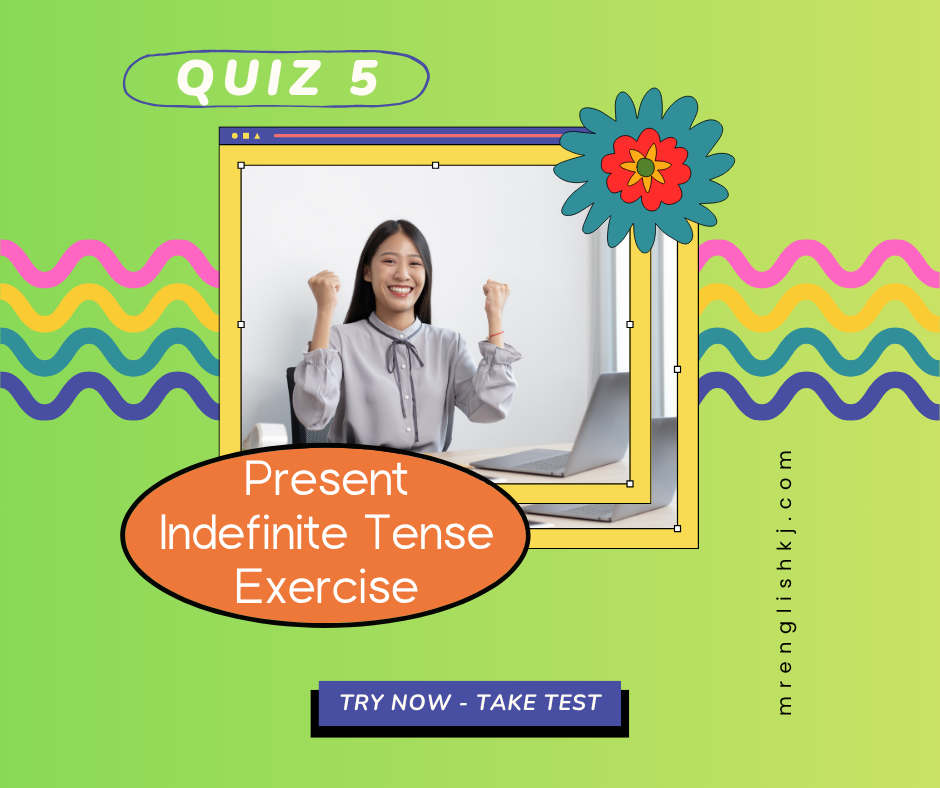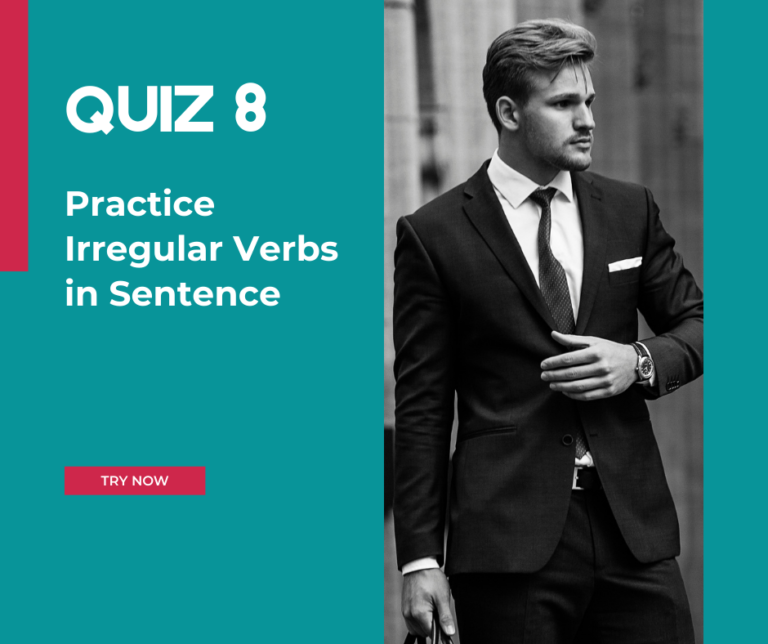
Present Indefinite Exercise 5 — Simple Present Tense Quiz with Useful Daily Vocabulary
Welcome to Present Indefinite — Exercise 5, part of our free English grammar quiz series.
In this set, you’ll practice the Simple Present tense while learning useful daily vocabularies—the kind you actually use when you manage work, decide things, arrange plans, fix problems, and improve skills.
Each question includes four choices, the correct answer, and a short explanation with a definition of the verb so you grow your vocabulary while mastering grammar.
Definition: Present Indefinite (Simple Present)
The Present Indefinite (Simple Present) describes habits, general truths, repeated actions, scheduled events, and states.
- Formation: base verb, verb 1st form, for I/you/we/they (e.g., I walk, they eat).
- Third person singular (he/she/it): add -s or -es on base verb (e.g., he walks, she goes).
- Use “do/does + verb 1st form” in negatives and questions.
- Use with adverbs of frequency: always, usually, often, sometimes, never.
- To learn more about Present Indefinite Tense – Visit Here
Quiz Instructions
- Read each question and choose the best answer out of four given options.
- On top, header section of the quiz, you will see the “title of the quiz,’ ‘spending-time,’ ‘value of question in points,’ and ‘number of questions.”
- Below on footer, you will see Full Screen mode. As the name suggests, it covers the whole screen. It will save a lot of your time attempting the quiz.
- You can zoom the images given in the questions.
- After submitting the quiz, you can see your score and compare with other users.
- The Full Leaderboard link will take you to a page, where you can see all users attempts.
- Below the quiz box, there are explanation of each options. You can study and try again.
- Best of Luck!
Quiz Question, Answer and Explanation
Note: Do remember in the quiz box above, the questions and options will shuffle, so they won’t have the same sequence like 1, 2, 3, or A, B, C as below.
1. She ______ her plants every morning.
A) water B) waters C) watered D) watering
Verb definition: water = to give water to plants.
Correct: B) waters
Why correct: She → waters.
Why others are wrong:
A) water — base form, wrong with she.
C) watered — past tense
D) watering — -ing.
2. They ______ their goals seriously.
A) pursue B) pursues C) pursued D) pursuing
Verb definition: pursue = to continue trying to achieve something.
Correct: A) pursue
Why correct: They + base pursue for ongoing habit.
Why others are wrong:
B) pursues — 3rd singular form; wrong for they.
C) pursued — past.
D) pursuing — participle.
3. He never ______ his password.
A) share B) shares C) shared D) sharing
Verb definition: share = to give a portion or disclose.
Correct: B) shares
Why correct: He (3rd sing.) → shares.
Why others are wrong:
A) share — base form; wrong for he.
C) shared — past.
D) sharing — -ing.
4. We ______ our work before lunch.
A) complete B) completes C) completed D) completing
Verb definition: complete = to finish something fully.
Correct: A) complete
Why correct: We + base complete for habitual action.
Why others are wrong:
B) completes — 3rd singular only.
C) completed — past.
D) completing — -ing.
5. She always ______ her keys on the table.
A) leave B) leaves C) leaving D) left
Verb definition: leave = to put/place something and go away.
Correct: B) leaves
Why correct: She → leaves.
Why others are wrong:
A) leave — base form.
C) leaving — -ing.
D) left — past participle/past tense.
6. I ______ my expenses every week.
A) record B) records C) recorded D) recording
Verb definition: record = to write down or store information.
Correct: A) record
Why correct: I uses base record.
Why others are wrong:
B) records — 3rd singular; wrong with I.
C) recorded — past.
D) recording — -ing.
7. He often ______ new recipes for dinner.
A) try B) tries C) tried D) trying
Verb definition: try = to attempt or test something.
Correct: B) tries
Why correct: He → tries; note -y → -ies change.
Why others are wrong:
A) try — base form, wrong with he.
C) tried — past.
D) trying — -ing form.
8. They ______ their children to respect others.
A) teach B) teaches C) taught D) teaching
Verb definition: teach = to help someone learn.
Correct: A) teach
Why correct: They + base teach.
Why others are wrong:
B) teaches — 3rd singular form; wrong for they.
C) taught — past tense.
D) teaching — -ing.
9. Our office ______ at 8 a.m. every day.
A) operate B) operates C) operating D) operated
Verb definition: operate = to function or work.
Correct: B) operates
Why correct: Office as a singular noun → operates.
Why others are wrong:
A) operate — base form; wrong for singular noun without auxiliary.
C) operating — -ing.
D) operated — past.
10. You ______ the printer when it stops.
A) fix B) fixes C) fixing D) fixed
Verb definition: fix = to repair or restore to working order.
Correct: A) fix
Why correct: You uses base fix.
Why others are wrong:
B) fixes — 3rd singular, wrong with you.
C) fixing — -ing.
D) fixed — past.


